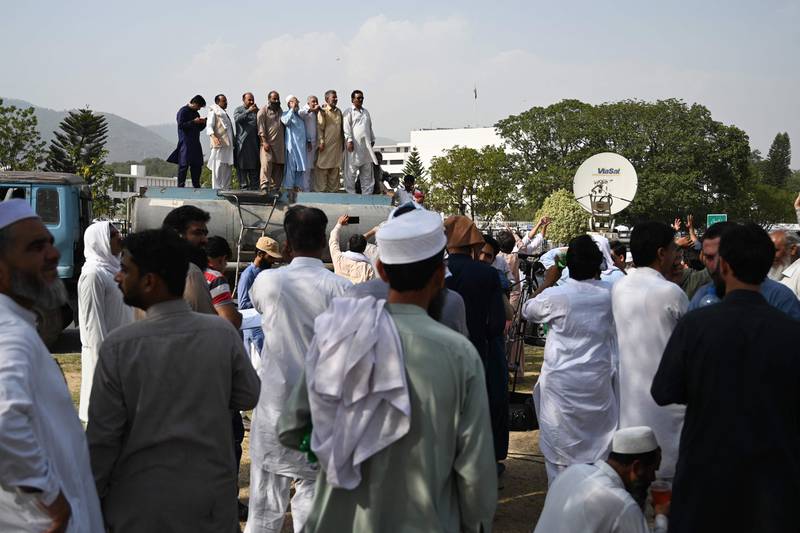Pakistan raises taxes to cut budget deficit amid tough IMF conditions for funding

Collected Image
Pakistan aims to trim its budget deficit by cutting spending and raising taxes as it looks to fulfil conditions to unlock a bailout from the International Monetary Fund.
Finance Minister Miftah Ismail, who presented the annual budget on Friday, lowered the shortfall to 4.9 per cent of gross domestic product in the financial year starting on July 1, from an estimated 6.3 per cent shortfall in the current year.
“We have started taking tough decisions, which is no doubt a difficult path, but is the only way to sustainable development,” Mr Ismail said. He added that the nation was ready for structural reforms.
Pakistan’s growth is expected to slow to 5 per cent in the next financial year from an estimated 6 per cent this year. Trimming the gap is a key criteria for gaining access to a $3 billion balance in an existing IMF programme. The South Asian nation has also raised fuel prices by 40 per cent and electricity tariffs by 50 per cent, before the budget, as it seeks to avoid descending into a Sri Lanka-style economic crisis. Surging global oil and commodity prices have eroded Pakistan’s finances. The nation of nearly 220 million people is facing depleting foreign exchange reserves, a falling currency, a rising current account deficit and Asia’s second-fastest rising inflation. It needs at least $41bn in next 12 months to stabilise its economic health.
The government expects to raise 7 trillion rupees ($34.6bn) in taxes next year, a 17 per cent rise on the current year. It plans to generate more revenue from its higher class by increasing taxes on high-income earners, luxury cars and real estate. It also plans a fixed tax on retailers, which have successfully lobbied against such a tax in the past. Pakistan also plans to raise 372bn in Eurobonds and sukuk, according to budget documents.
Finance Minister Miftah Ismail, who presented the annual budget on Friday, lowered the shortfall to 4.9 per cent of gross domestic product in the financial year starting on July 1, from an estimated 6.3 per cent shortfall in the current year.
“We have started taking tough decisions, which is no doubt a difficult path, but is the only way to sustainable development,” Mr Ismail said. He added that the nation was ready for structural reforms.
Pakistan’s growth is expected to slow to 5 per cent in the next financial year from an estimated 6 per cent this year. Trimming the gap is a key criteria for gaining access to a $3 billion balance in an existing IMF programme. The South Asian nation has also raised fuel prices by 40 per cent and electricity tariffs by 50 per cent, before the budget, as it seeks to avoid descending into a Sri Lanka-style economic crisis. Surging global oil and commodity prices have eroded Pakistan’s finances. The nation of nearly 220 million people is facing depleting foreign exchange reserves, a falling currency, a rising current account deficit and Asia’s second-fastest rising inflation. It needs at least $41bn in next 12 months to stabilise its economic health.
The government expects to raise 7 trillion rupees ($34.6bn) in taxes next year, a 17 per cent rise on the current year. It plans to generate more revenue from its higher class by increasing taxes on high-income earners, luxury cars and real estate. It also plans a fixed tax on retailers, which have successfully lobbied against such a tax in the past. Pakistan also plans to raise 372bn in Eurobonds and sukuk, according to budget documents.
Source: https://www.thenationalnews.com
Tags :
Previous Story
- UK to probe 'systematic bias' in medical devices...
- Saudi Arabia agrees to provide $4.2bn in financial...
- You can now take a flight on a...
- Philippines extends travel ban on 10 countries including...
- Global chip shortage hits Pakistan's automobile industry
- Emirates says flight ban from India, Pakistan, Bangladesh...
- Emirates issues new travel advisory for flights from...
- UAE: India, Pakistan, Bangladesh flight suspension extended until...